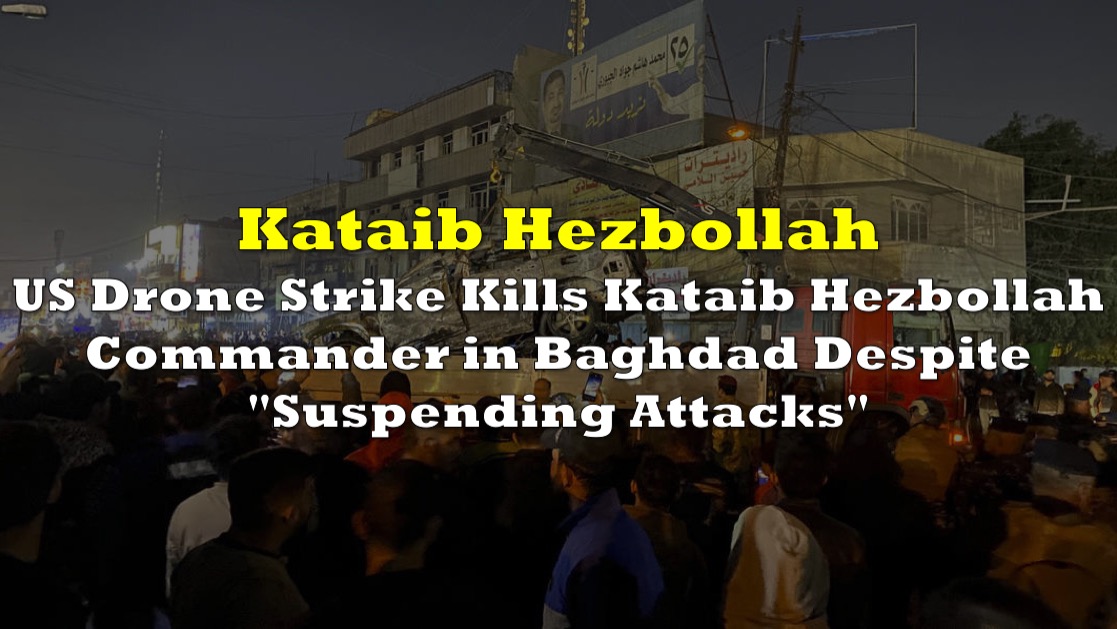In a recent development in the ongoing tensions between the United States and Iran-backed militias in Iraq, a U.S. drone strike conducted in Baghdad has resulted in the death of two high-ranking commanders of Kataib Hezbollah. The strike, approved by President Joe Biden, targeted the commander responsible for orchestrating attacks on American forces in the region. This move marks a significant escalation in the U.S. efforts to deter attacks on its personnel stationed in Iraq.
Abu Baqir al-Saadi and Arkan Al Alaywi both High-Ranking Leaders within the Iranian-Backed Militia Group, Kata'ib Hezbollah have reportedly been Killed in an Assassination Airstrike, likely by a U.S. MQ-9 “Reaper” Drone, tonight on their Vehicle in Eastern Baghdad, Iraq. pic.twitter.com/gBOPrY3vys
— OSINTdefender (@sentdefender) February 7, 2024
The Pentagon confirmed that the targeted individual, whose identity was not disclosed by U.S. officials but identified as Abu Baqir al-Saadi in Iraqi media reports, played a central role in planning and executing attacks against American forces. This strike comes in the wake of increased hostilities between Iranian-backed militias and U.S. forces, particularly following a deadly strike on a U.S. base in Jordan last week, which claimed the lives of three Americans.
BREAKING:
— Visegrád 24 (@visegrad24) February 7, 2024
Crowds are surrounding the US Embassy in Baghdad after the U.S. drone strike in Baghdad killing 2 high-level commander of the Iranian proxy group Kataib Hezbollah 2 hours ago. pic.twitter.com/wGN32afW3J
Footage from Baghdad suggests the US drone strike that killed 3 people with Kataib Hezbollah hit precisely the car they were traveling in, on a busy Baghdad street, but caused no other damage. CENTCOM says no collateral damage or casualties pic.twitter.com/a6zWmT5ov1
— Liz Sly (@LizSly) February 7, 2024
Kataib Hezbollah, acknowledging the U.S. strike, issued a statement reaffirming its commitment to armed struggle, while also hinting at possible retaliation. “This calls for steadfastness on the path of jihad,” the group declared, indicating its readiness to respond decisively to what it perceives as aggression against its members and interests.
The group had said that it was suspending attacks on American troops to avoid embarrassing Iraqi government after the Jan. 28 strike in Jordan.
They suspended attacks because they were afraid.
— Evergreen Intel (@vcdgf555) February 8, 2024
And, turns out, for good reason. https://t.co/Wg2Y03OcY9
Iraqi Prime Minister Mohammed al-Sudani condemned the U.S. strike, accusing the United States of violating Iraq’s sovereignty. Al-Sudani’s spokesperson stated that the strike would prompt Baghdad to reconsider the presence of the U.S.-led military coalition in Iraq, raising concerns about potential strains in the already delicate relationship between the two nations.
This latest drone strike follows a series of retaliatory actions by the United States against Iranian-backed militias in response to attacks on American personnel and interests in the region. The U.S. has intensified its efforts to target leaders of these groups, signaling a shift in strategy aimed at disrupting their capabilities to plan and execute future attacks.
Andrew Tabler, a former Middle East director at the White House’s National Security Council, highlighted the significance of targeting leadership figures within these militias. “Now, the U.S. is going after the brains of the operations,” Tabler remarked, emphasizing the potential impact of such strikes in preventing future attacks on American forces.
The escalating tensions between the United States and Iran-backed militias pose significant challenges for regional stability. The U.S. has reiterated its commitment to defending its personnel and interests in Iraq, while also seeking to navigate diplomatic channels to address underlying grievances and reduce the risk of further escalation.
Information for this briefing was found via The Wall Street Journal and the sources mentioned. The author has no securities or affiliations related to the organizations discussed. Not a recommendation to buy or sell. Always do additional research and consult a professional before purchasing a security. The author holds no licenses.




